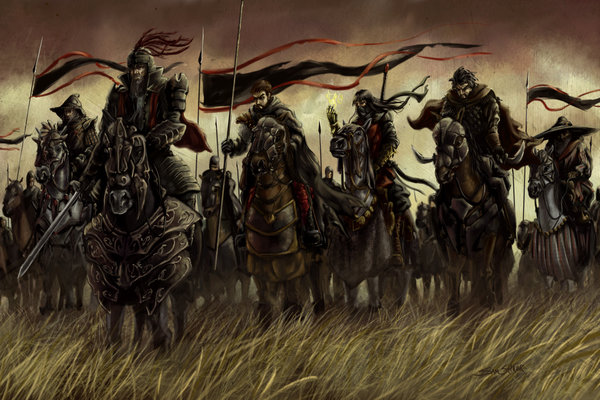Sellswords are the main fighting force of a mercenary company. Assuming you have the required reputation, sellswords can be hired for the below prices:
Recruit: 10g
Militia/Skirmisher/Acolyte: 50g
Footman/Hunter/Adept: 125g
Warrior/Warden/Mage: 225g
Blademaster/Ranger/Wizard: 350g
Below is an example of a sellsword stat block.
Timmy, Dwarf Wizard Footman, Equipment: Standard, XP: 5, HP: 15/15, Frt: 10, Mob: 6, Arc: 13, Feats: N/A, Friends: N/A, Enemies: N/A, Upkeep: 25
Name: The name of the sellsword. When you hire a new sellsword, you may choose the name, unless you are hiring an npc.
Race: the race of the sellsword. Different races provide different starting bonuses. You may choose the race of a sellsword if it is a generic hire (special hirable NPCs’ races are pre-decided).
Race
Fortitude
Mobility
Arcana
Dwarf 2 0 0
Human 0 2 0
Elf 0 0 2
Half-Orc 1 1 0
Half-Elf 0 1 1
Halfling 1 0 1
Xp and Classes: Sellswords can advance along three generic class lines (Soldiers, Scouts and Spellcasters), as well as multiclass between two class lines, as they gain experience. There are three class lines, each focusing on one of the three attributes (see
Attributes section below), with each line being divided into 4 classes. Sellswords begin as
Recruits, the first ‘generic’ class, who after gaining enough experience, may choose their main class, advancing into the second tier. The first tier of each class are
Militia (fortitude),
Skirmisher (mobility), and
Acolyte (arcana). Once enough XP has been gained, a sellsword may proceed to the next class, or pick up a subclass line, beginning at the lowest class (militia, skirmisher, acolyte), adding together the attributes of the main class and the subclass. A sellsword may only have one subclass, and the subclass can never be a higher than the main class. Sellswords can be leveled up at
10, 25, 50, 90, 150, 235, 350, 500, and 690 xp.
Line
Class
HP
Fortitude
Mobility
Arcana
Upkeep
Generic Recruit 1 1 1 1 1
Spellcaster Acolyte 2 1 1 2 2
Spellcaster Adept 4 2 2 4 5
Spellcaster Mage 7 3 3 7 10
Spellcaster Wizard 11 4 4 11 20
Soldier Militia 2 2 1 1 2
Soldier Footman 4 4 2 2 5
Soldier Warrior 7 7 3 3 10
Soldier Blademaster 11 11 4 4 20
Scout Skirmisher 2 1 2 1 2
Scout Hunter 4 2 4 2 5
Scout Warden 7 3 7 3 10
Scout Ranger 11 4 11 4 20
Attributes: All sellswords posses HP, as well as three combat attributes: Fortitude, Mobility and Arcana. Once a sellsword reaches 0 HP, they will die. Resting one turn (taking no actions) will return 25% of max HP.
In combat, attributes each have a target attribute they do extra damage to. Fortitude targets Mobility, Mobility targets Arcana, and Arcana targets Fortitude. Each attribute is also countered by itself (Fortitude is countered by Fortitude, etc). See more details in the
Combat section below.
Equipment: Equipment is the quality of weapons, armour and gear a sellsword is using. Equipment affects the frt/mob/arc of a sellsword. Over time and use equipment will lower in quality, and new equipment must be bought to replace it. Equipment levels and their effects are:
Decrepit: -8
Rusty: -4
Worn: -2
Standard: 0
Mint: 2
Mastercraft: 4
Legendary: 8
Feats: Every time a sellsword levels up, they may choose a feat. Feats may all be taken multiple times.
Generic Feats
- Plains Wanderer: +1 to frt/mob/arc when in planes terrain. May be taken 3 times.
- Forester: +1 to frt/mob/arc when in forest terrain. May be taken 3 times.
- Mountaineer: +1 to frt/mob/arc when in mountain and hills terrain. May be taken 3 times.
- Urban Crawler: +1 to frt/mob/arc when in settlements. May be taken 3 times.
- Cave Delver: +1 to frt/mob/arc when underground. May be taken 3 times.
- Sailor: +1 to frt/mob/arc when on ships. May be taken 3 times.
Soldier Line Feats
- Tough: +1hp
- Brothers in Arms: +1 to frt per every 2 friendly soldier line sellswords in battle.
- Tank: Double frt if there are no other friendly soldier line sellswords in battle.
Scout Line Feats
- First Shot: Deal 1hp of damage to a random enemy automatically before battle.
- Wolfpack: +1 to mob per every 2 friendly scout line sellswords in battle.
- Lonewolf: Double mob if there are no other friendly scouts line sellswords in battle.
Spellcaster Line Feats
- Healer: heal 1hp of damage on random ally after battle.
- Arcane Battery: +1 arc per every 2 friendly spellcaster line sellswords in battle.
- The One: Double arc if there are no other friendly scouts line sellswords in battle.




